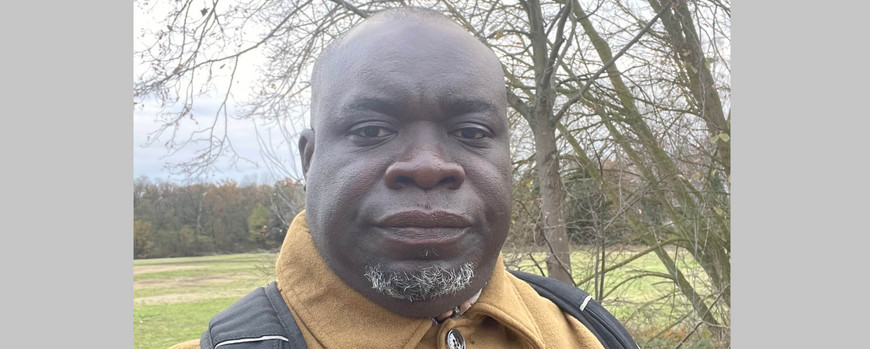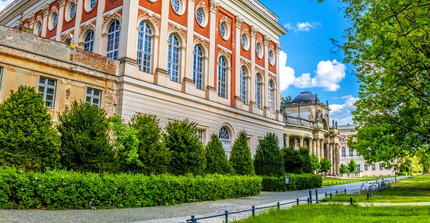Prof. Dr. Charles Ofosu Marfo
UP Reconnect Guest: Prof. Dr. Charles Ofosu Marfo
Visiting from: Ghana
Home Institution: Kwame Nkrumah University of Science & Technology, Kumasi
Host at the UP: Prof. Dr. Hans-Georg Wolf
Institute at the University of Potsdam:Institute of English and American Studies
Time of the visit: November - December 2023
Prof. Dr. Charles Ofosu Marfo studied Linguistics and Philosophy at the University of Ghana (1993 to 1997), Linguistics at the University of Tromsø (1998 to 2001), and in 2005 he completed his doctorate in Linguistics at the University of Hong Kong S.A.R. Since 2017 he is an Associate Professor at the Department of Language and Communication Sciences at the Kwame Nkrumah University of Science & Technology, Kumasi, Ghana. In this interview, he talks about his current research and upcoming collaborations between the University of Potsdam and the Kwame Nkrumah University of Science & Technology.
Dear Charles, you were already a DAAD visiting professor at the Institute for English and American Studies at the University of Potsdam from 2014 to 2015. Please tell us how you experienced your stay in Potsdam back then.
In general, I experienced scintillating sights and sounds of people and their community; I had a great time in Potsdam, and at the University of Potsdam in particular. Resources were at my disposal to make my work easy and enjoyable, and to deliver. The students I taught and engaged were welcoming and ready to learn the respective courses I taught, which included Introduction to Linguistics, African Englishes, Pragmatics and Intercultural Communication. Also, the faculty I had to work with, particularly the people in the Institute for English and American Studies, were cooperative and supportive enough and these made my settling in at the University better.
Now you are here again at the invitation of Prof. Dr. Wolf as part of the UP Reconnect program. One of the purposes of your stay is to prepare for a student excursion to Ghana. What do you personally gain from the collaboration and exchange with students?
There are a lot of benefits to enjoy from every collaboration and exchange, including synergy, sharing of ideas and resources, promotion of knowledge and broadening of one’s horizon. Personally, I have gained from benefits like these and I hope to explore even further for more.
A partnership is to be established between the Kwame Nkrumah University of Science and Technology, where you are Provost of the College of Humanities and Social Sciences, and the University of Potsdam. How could this look like?
It will look like and will be a win-win situation. I believe the two institutions have their individual strengths the other could exploit for its benefit and that of the established partnership. For instance, there could be student and staff exchanges and, in terms of continuous resource development, staff training between the two universities could be initiated. Once these are done and done well, we can enjoy the fruits of our partnership.
Please give us an insight into your research – what are you currently working on the most and what does your day-to-day work look like?
I do research in various aspects of language and linguistics, particularly phonology, morphophonology and morphosyntax within a number of frameworks. In the recent past, however, I have also been involved in aspects of applied linguistics and translation studies due to supervision of students, examination of student works, and mentoring responsibilities.
You completed your studies in Ghana, Norway and Hong Kong S.A.R. (China). What brought you to these countries and how did this time shape you?
While the desire to explore and know or understand many cultures has motivated me over the years, financial support to study has been the main attraction that brought me to the various countries I have gone to study. The time I spent in these countries, however, has contributed immensely to shaping the way I see the world and my sense of consideration of issues of global significance. Thank you.
Thank you for the interesting interview and we wish you all the best for the future!


